This is my third Donald Sutherland post in the wake of his death, but it’s really worth watching for the portion that begins around 9:15. Sutherland and Anderson Cooper are watching the young-daughter-has-drowned scene from Don’t Look Now, and Sutherland’s reaction…just watch it.
Issue with Knox Bronson
Posted yesterday by Knox:
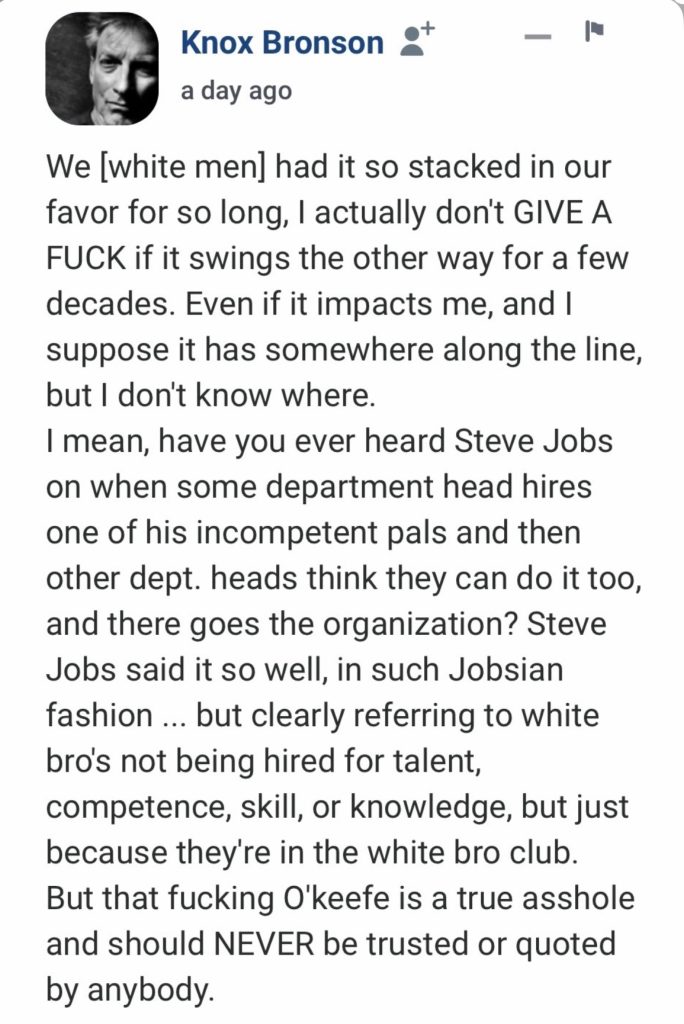
Concerned Bruh sent this along this morning:
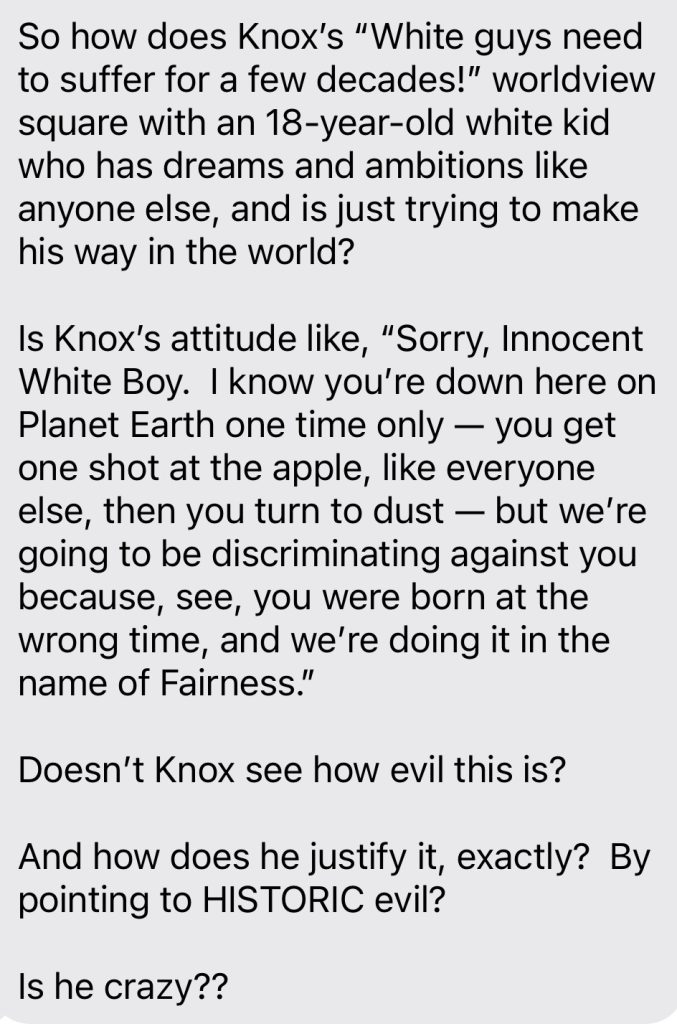
When “Domino” Was In Play
18 and 1/2 years ago, the following conversation really happened:
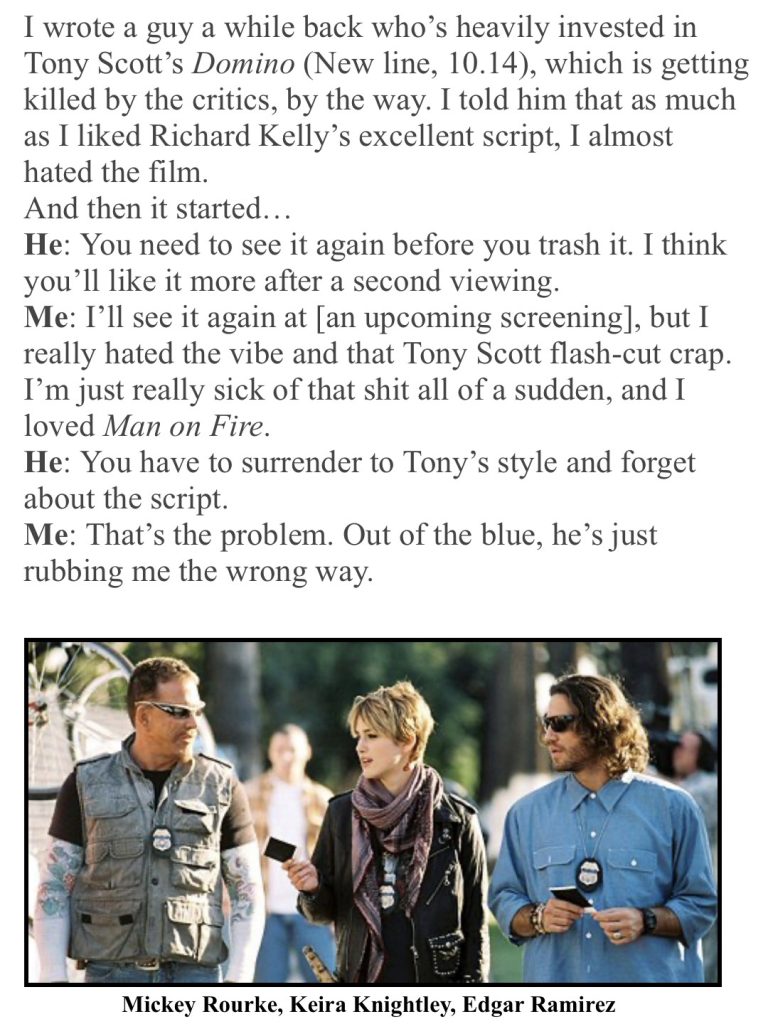
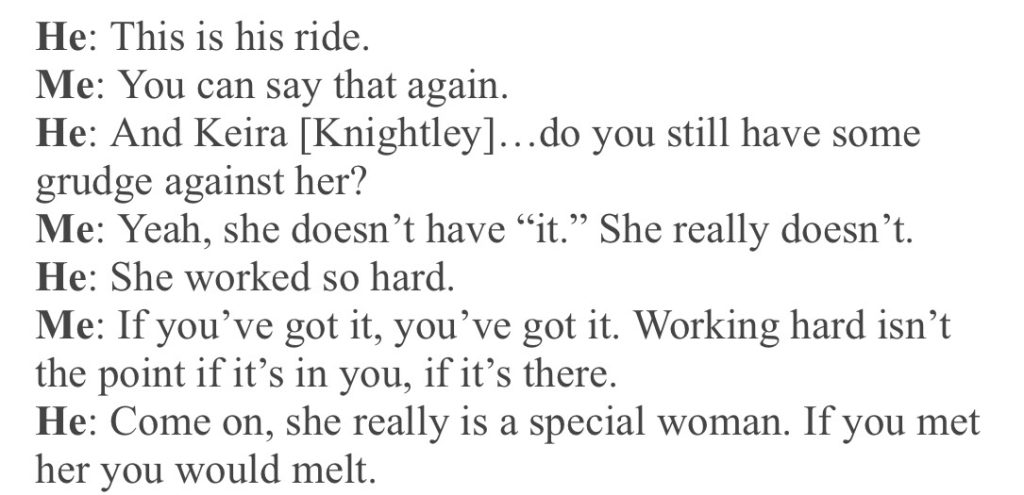


I Was Getting Gas
…at a nearby Shell Station around 9:15 am this morning. The mechanic and I were talking about an engine leak needing to be fixed; he told me to come back on Tuesday, 6.25 at 9 am. I was in a hurry to take care of something else so I jumped into the car and drove off.
Alas, the gas nozzle and the black hose were still attached…bong, bang, clap.
I told the attendant (a slender Indian guy) what had happened and he immediately frowned and sternly wagged his finger and told me I would have to pay a $160 repair fee. I would have paid $40 or $50 but I said “sorry, Jose but no way” on the $160. I went back to the mechanic and profusely apologized for what had happened, and he said “don’t worry, we’ll take care of it.”
The Indian guy was glaring daggers. If looks could kill…
I’m sure that people drive off with a gas nozzle in their tanks all the time. I’m sure that the gas pump designers have made sure that the gas hose pops out easily when this happens. This must be a regular occurrence…dozens of times each day on a nationwide basis.
4K “Chinatown” Inventory Is Already Depleted
The new Chinatown 4K Bluray popped three days ago (6.18) and it’s already sold out, at least according to Amazon.

“Vudu’s 4K Chinatown,” posted on 8.3.19 or nearly five years ago: Last night I watched a 4K UHD version of Chinatown on Vudu. I could tell right away it’s not a fresh re-harvesting from the best celluloid elements. Jack Nicholson’s hair looks too inky at times. And the bandage on his nose looks too white, too bleachy.
But it’s quite beautiful for the most part. It certainly looks better than the most recent Chinatown Bluray. The sharpness, the textures, the stronger colors. But then I’m a plebe about this stuff.
HE to restoration guy: “I’m presuming you’re not impressed. Because it’s probably just a tweaking of the last harvest. But maybe I’m wrong. Know anything about it?” I then sent him the below attached photos for samples.
Restoration guy to HE: “This is pretty bad. It’s all about data throughout. And this doesn’t seem to have it. I watched a 4K DCP Chinatown last Tuesday. It’s gorgeous. The studio did a terrific job, especially with color, which is warm. And it looked nothing like these images.”
HE to restoration guy: “Wait…you watched a 4K Chinatown DCP? It was shown to ticket buyers? Why did they create this? They must be intending to issue a 4K Bluray in 2024, to celebrate the 50th anniversary. Just like Sony’s intention to wait until 2022 to issue a 4K Lawrence of Arabia Bluray, even though Grover Crisp’s 8K scan was harvested…what, back in ‘15 or thereabouts?”
HE to restoration guy: “I’m nonetheless telling you that as much as you may disapprove of Vudu’s 4K version of Chinatown, it really does feel like an improvement over the 1080p Bluray. It delivers a bump effect…’wow, this looks better in some respects.’ True, the images look waxy and Jack’s dark hair looks inky. It looks superficially enhanced, yes, but it’s a nice cheap high.”
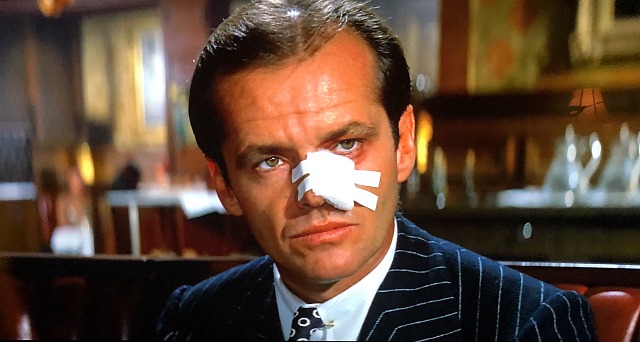
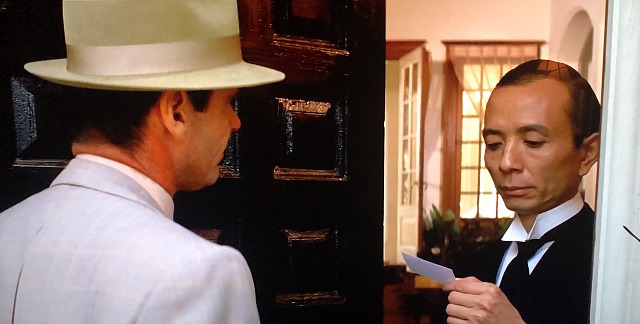

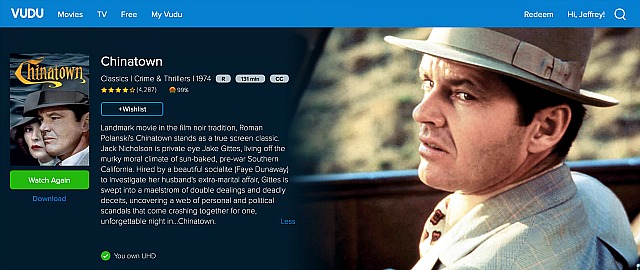

Sick of Larrain’s “Famously Distraught, High-Profile Women” Dramas
Pablo Larrain really needs to disengage from his cinematic obsession with bothered, conflicted, high-profile women.
First it was Jackie (’16), which starred Nathalie Portman as JFK’s widow — a film that I honestly didn’t care for. Five years later came Spencer (’21), a weird fantasy-laden psychodrama in which Kristen Stewart played Diana Spencer. And now comes Maria, a portrait of Maria Callas (Angelina Jolie) in the ’70s, directed by Larraín and written by Steven Knight.
Maria will probably debut in Venice and then play the Telluride Film Festival immediately after.
HE admired Jolie’s performance in A Mighty Heart, but turning her kids against their dad, Brad Pitt, to the point that a couple of them are looking to legally ditch the Pitt name… that’s just shitty. Abusive alcoholics who’ve gone sober and have cleaned up their act deserve a little slack, a little forgiveness. So if it’s okay HE’s basic attitude is “eff Jolie.” Which also means, for the time being, eff Maria unless it’s blazingly good or, you know, extra-special wowser.
Zotz The Trump Stooge — Aileen Cannon Is A Shameless Fellator
From Sean O’Driscoll’s 6.21 Newsweek story, titled “Court That Can Remove Aileen Cannon ‘Wants Her Out’: Legal Analyst”:
“Harry Litman, a former federal prosecutor and Democrat Party supporter, said that Cannon’s ruling on a potential Trump gag order could lead to an appeal. He said that the 11th Circuit Appeals Court, which covers Florida, would like to remove Cannon from the case and appoint a new judge.”
HE’s Four Favorite Sutherland Scenes
In this order…these are the keepers. The 1900 “communists are pussycats”scene is my least favorite.
Imagine Being “Fangs”
Earlier today Jordan Ruimy posted that story (which I posted yesterday) about that Disney exec Michael Giordano, etc. You know…the one in which he admitted in a covertly recorded video that Disney generally prefers to not hire youngish straight white guys while concurrently favoring POC and LGBTQ applicants.
After the initial story broke on 6.20 Giordano went on a “leave of absence” (i.e., was told by Disney management to either disappear or, you know, commit suicide by jumping off a tall building).
I love Fang’s response to Ruimy’s article, Fang exemplifies woke haters, i.e., the same kind of people who yesterday tried to slit my social-media throat because I had the utter temerity to use, in passing, an alternate, biologically accurate term for…okay, let’s not go there again. The ugliness of the righteously woke is unceasing on comment threads these days.

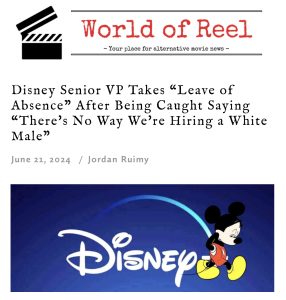
Menage a Trois with Yul Brynner and Wifey
Eddie Murphy‘s story about having been obliquely propositioned by Yul Brynner arrives at the 6:20 mark. It happened in ’80 at Studio 54, and that was during the celebrated nightclub’s heyday.
I know this is getting redundant but Murphy’s anecdote allows me to recount another story about my randy Manhattan history (i.e., “getting tail” in the ’70s and ’80s).
My episode also happened in ’80. I was at an invitational Manhattan soiree of some kind, and it was ’round midnight. A moderately foxy blonde (an 8.5) invited me to a wee hours party in Grennwich, CT. I was immediately intrigued until I realized she and her husband were inviting me to a swinging party. I took one look at the husband, who was eyeballing me with a certain subdued interest, and said to myself “no fucking way…I’m not going to exchange fluids with this guy’s wife as he watches or, God forbid, decides to take part.”
I thanked them for the invitation but politely declined. Partly because hubby was a bit creepy looking (balding, moustache), but I would have begged off even if he’d resembled American Gigolo‘s Richard Gere. I had a strict “no dicks” policy back then. The idea of even glancing at some other guy’s gross animal member filled me with profound discomfort.
Okay, that’s not entirely true as I went three or four times to the Hellfire Club in ’80 and ’81 and and I certainly caught sight of a few dangling schlongs, but I didn’t like it. I was there for the babes and the babes alone.
HE to Sean McNulty: It’s spelled “Yul Brynner.”
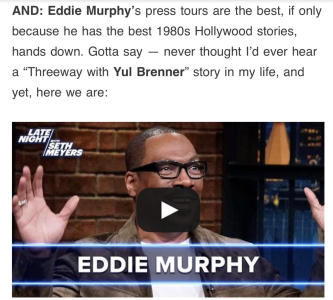
All Hail Donald Sutherland
Sutherland’s greatest period was that ’70 to ’73 four-year streak — M.A.S.H. (’70), Alex in Wonderland (’70), Little Murders (’71), Johnny Got His Gun (71), Klute (’71), Steelyard Blues (’72) and Don’t Look Now (’73). And to think of him lowered by a paycheck role in The Hunger Games! For actors in particular, old age is not for sissies.
“Deals Straight Cards, Doesn’t Do Froth,” posted on 11.9.17:
“Like most podcasters, Variety‘s Kris Tapley likes to keep things loose, chatty and breezy when he interviews a Hollywood guest.
“It’s fair to say that this mindset didn’t quite mesh with 82 year-old Donald Sutherland, star of Sony Pictures Classics’ The Leisure Seeker (1.19.18) and a trophy recipient at this weekend’s Governor’s Awards.
“Sutherland is a truth–teller, a take-it-or-leave-it reality guy. He gushes about co-workers like anyone else, but if he didn’t get along with someone during the making of a film and still has a bad taste in his mouth about it, he doesn’t mince words.
“He went there this morning during a chat with Tapley, and it sounded to me as if Sutherland’s candor threw his host off-balance.
“In this morning’s “Playback” podcast, Sutherland dissed (a) the late Great Train Robbery director Michael Crichton, basically calling him a cold, heartless prick; (b) spoke about what a shit director Richard Marquand was for arranging for Sutherland to smash his hand through real glass during the shooting of Eye of the Needle (’81); and (c) expressed disdain for the late Robert Altman when producer Ingo Preminger told him that Altman was against casting Sutherland in M.A.S.H. and, when told Sutherland was a keeper, said he didn’t want Sutherland to get top billing.
“Sutherland also talked about what a serious and personal heartbreaker it was when the Dodgers’ Rick Monday hit a home run against the Montreal Expos in ’81.
“‘This is not the detour I was expecting,’ Tapley said. ‘
“‘Why would you expect a detour?,’ Sutherland replied. ‘What’s the point of expecting anything? You just concentrate.’
“Sutherland is currently shooting James Gray‘s Ad Astra, which costars Brad Pitt, Tommy Lee Jones and Ruth Negga. Films containing my favorite Sutherland performances, in this order: (1) Ordinary People, (2) Don’t Look Now, (3) JFK, (4) Little Murders, (5) Steelyard Blues, (6) M.A.S.H., (6) Klute, (7) Eye of the Needle and (8) Space Cowboys.”
Between the Lines, Baby
Posted earlier this afternoon by Outkick:
“It’s a not-so-well-kept-secret that the Walt Disney Company often prioritizes skin color in hiring over things like experience, ability and qualifications.
“A damning video captured by O’Keefe Media Group, founded by James O’Keefe, shows a Disney executive, Michael Giordano, telling an undercover reporter all about the discriminatory practices.
“‘Certainly, there have been times where there’s no way we’re hiring a white male for this,’ Giordano said.
“The reporter suggests that this was an ‘unspoken’ agreement, but Giordano shared that it’s actually been said in front of him. However, he said that they are careful how they message those things to outside parties, like talent agents.”
BREAKING: Senior Vice President at The Walt Disney Company details discriminatory hiring practices: "Nobody else is going to tell you this, but they're not considering any white males for the job," says Michael Giordano, a Vice President of Business affairs, "there’s no way we’re… pic.twitter.com/IMOsFOLKro
— James O'Keefe (@JamesOKeefeIII) June 20, 2024

